unit5 warming up[上学期]
文档属性
| 名称 | unit5 warming up[上学期] |
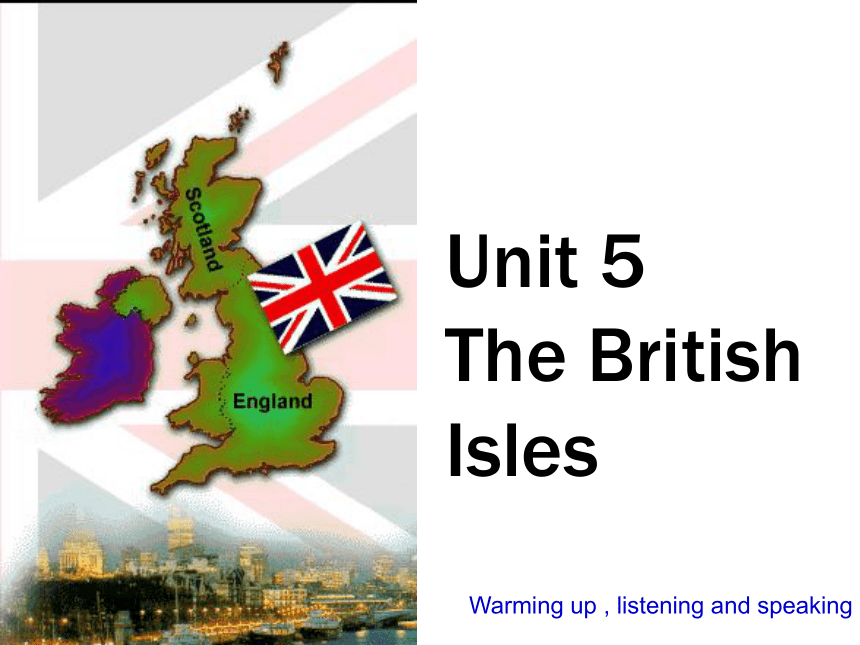
|
|
| 格式 | rar | ||
| 文件大小 | 9.0MB | ||
| 资源类型 | 教案 | ||
| 版本资源 | 通用版 | ||
| 科目 | 英语 | ||
| 更新时间 | 2006-11-28 00:00:00 | ||
图片预览


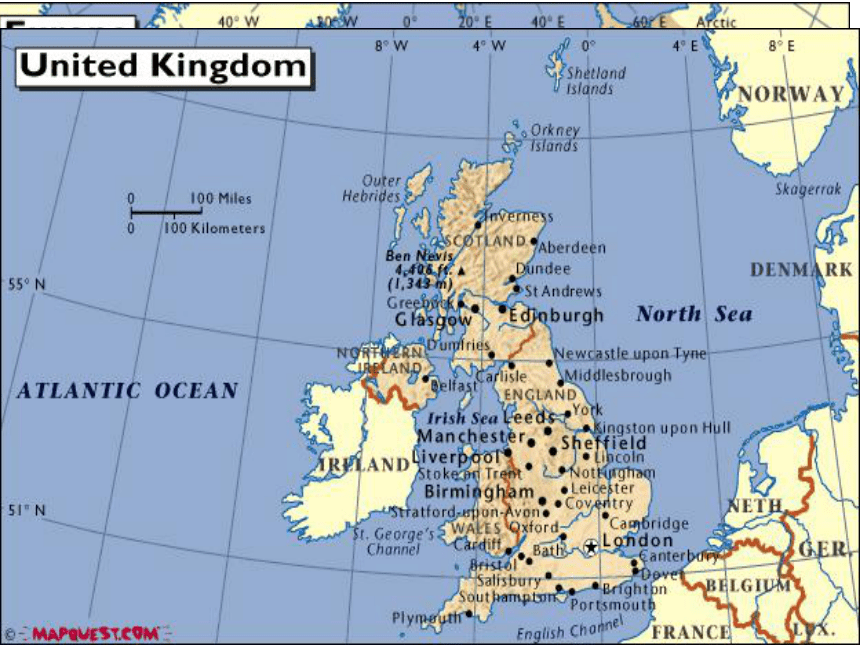
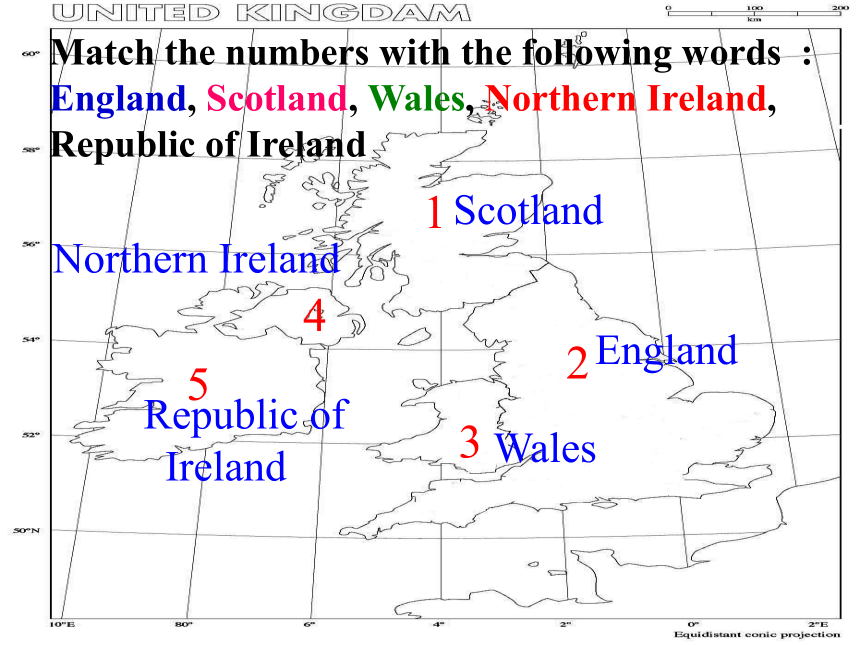

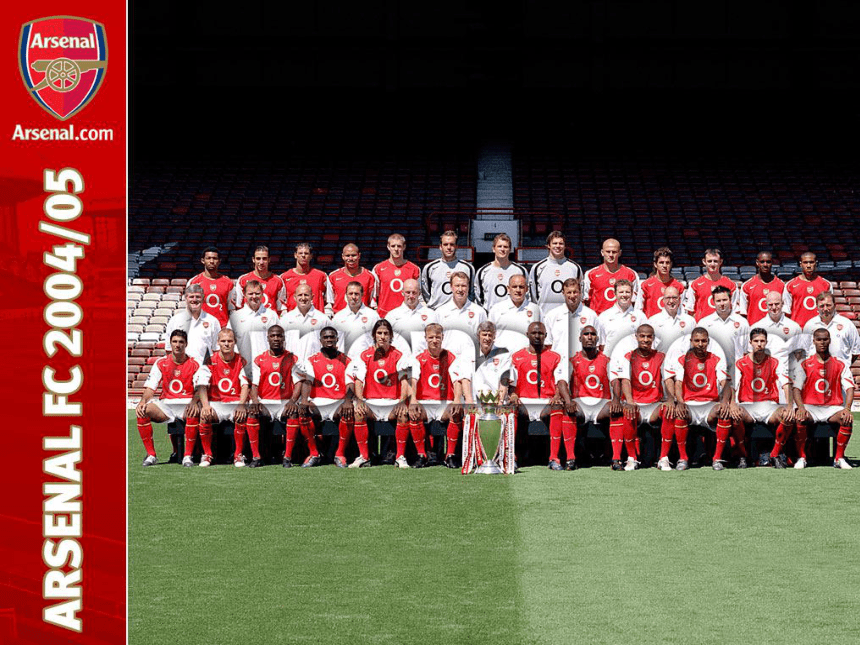

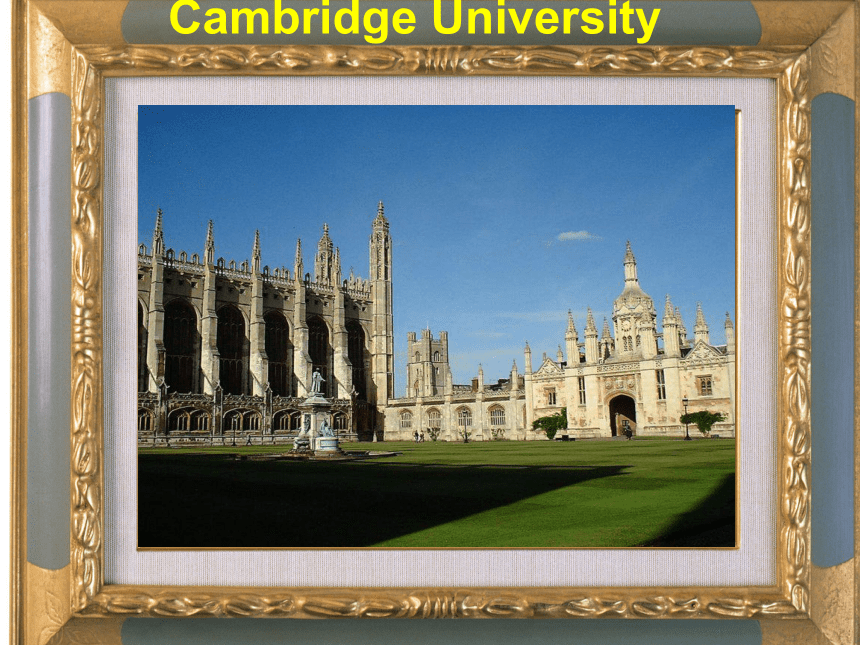




文档简介
课件30张PPT。Unit 5 The British IslesWarming up , listening and speaking 1.What is the full name of the UK?“United Kingdom of Great Britain and Northern Ireland”
(大不列颠及北爱尔兰联合王国)2.Where is it? And how many part is it made up of? And what are they?It lies off the northwest coast of Europe. And it is made up of four parts. They are: England, Wales, Scotland and Northern Ireland.12345ScotlandEnglandWalesNorthern IrelandRepublic of
IrelandMatch the numbers with the following words :
England, Scotland, Wales, Northern Ireland, Republic of Ireland3. What is the UK famous for? Think about sport, art, architecture, film, literature, food and life. Gerrard Owen Beckham The Beatles spice girls Cambridge UniversityOxford UniversityShakespearePercy Bysshe ShelleyCharles Dickens Francis Baconfish and chipsWhiskySymbols of London and England River Thames 泰晤士河 Big ben 大本钟
London bridge 伦敦桥
Westminster Abbey 威斯敏斯特教堂 Royal Family--- Buckingham Palace 白金汉宫 Greenwich Observatory 格林威治天文台 Official flag--- Union Jack
Double decker bus 双层巴士
Bobbies ( nickname for policeman)
It includes the UK and the Republic of Ireland, and many other small islands and seas.ScotlandEnglandWalesBritain(northern Ireland)the UK(the Republic of Ireland)the British Isles4. What is “The British Isles” made up of?(the Isle of man)15324EnglandWalesThe Republic of IrelandScotlandNorthern IrelandEdinburghCardiffLondonBelfastDublinListeningListen to the tape and tick the sentences which are true.
( ) 1.The Conversation Workshop is taught on
Wednesday afternoon.
( ) 2.Classes in the computer lab are taught during
the third lesson every day.
( ) 3.Reading is taught in two classes on Friday morning.
( ) 4.The library is open on Saturday from 8:30 am to
10:00 am.
( ) 5.Dave teaches classes in the computer lab. Listen to the tape and answer the following questions.1.What do you have to do if you cannot come to school on Tuesday?2.What do you do in the classes of skills practice?3.What are the opening hours of the language lab?Call your teacher half an hour before class beginsIn the classes of skills practice the students practise listening and speakingThe Language lab is open on week days/from Monday to Friday, from 8:30 am till 8:00 pm.Listening Good morning and welcome to the Language Scool at Dublin University. I’m very happy to greet you all to our summer programme and hope that you will not only learn a lot more English ,but also learn about the Irish way of life. Before you go to your classrooms, I want to have a quick look at your weekly timetable with you. Classes are taught from Monday to Friday with four classes in the morning and three classes in the afternoons. One lesson takes up 50 minutes. We start every morningWith two lessons of what we call Language Study, Which will mostly be grammar and vocabulary. The rest of the morning classes are either spent in the computer lab, or in workshops. There’s a Conversation Workshop to practise your speaking skills, one lesson on Tuesday,directly after the Language Study class and there’s a Reading Workshop of two times fifty minutes on Friday morning.There are also two fifty minutes classes in the computer lab which from the third classon both Wednesdays and Thursdays. Lunch is from half past twelve till one o’clock . Each afternoon, except for Wednesday, starts with two lessons of skills practice. In those classes you will mostly practise listening and speaking. On Monday and Tuesday they are followed by a class of fifty minutes at the language lab. The language lab is open Monday to Friday from half past eight in the morning until eight o’clock in the evening, while the library is open every day, including the weekends, from eight am till ten pm. Language study and the classes in the computer lab are taught by Dave. Conversation and skills are taught by Flora and Sarah. Reading is taught by Andrew and the teacher who will be with you in the language lab is Julia.If for some reason you cannot come to class, you have to phone your teacher half an hour before class begins.
Step 3 SpeakingDon’t you think that...?
I don’t think that’s right...I don’t think so.
You must be mistaken...No, you are wrong thinking about...
I’m afraid you’re wrong...?Aren’t you confusing...?
I’m not so sure about that...Surely it must be...
Yes, you are right, but...I believe that you’ve got it right.
Yes, I agree with you.Sentence patterns: Speaking
Sample dialogues:
Situation 1:
A: I don’t think learning a language is so difficult. When you live in a country where you speak that language, you can hear it and practise it every day.
B: well, that would certainly be helpful, but not everybody can go abroad. Besides, it should be possible to learn a language well before going to another country.
C: I agree with A.
B: I think it depends on yourself. Of course you have to spend enough time on learning.
D: Do you think it’s a matter of time?
B: Yes. You are right. Time is the most important. The more time you take to practise, the better you’ll be.
A: That depends on you. It’s hard to tell, but for easy languages such as English you can learn a lot in only a few hundred hours. D: Some people spend a whole lifetime without really learning much.
C: Very funny! It sounds nice, but some languages are too difficult. Take Chinese, for example, how many hours does it take to learn that?
B: Yes. That’s a good example. Chinese takes perhaps four or five times more time to learn than English or Spanish.
D: You mean for somebody whose language isn’t English or Chinese?
B: Exactly.
C: I disagree. I think you are wrong thinking that it will take anyone a short time to learn English, but a long time to learn Chinese. Both English and Chinese are very different. That’s why it takes Englishmen a long time to learn Chinese. But then it should work the other way around as well. Because they are so different, it will take Chinese people four times more time to learn English than for example somebody who speaks Spanish.
… Situation 2:
A: Of course it is easy to learn geography by reading a book and studying a map. You just look at the map and remember where places are. It’s as simple as that.
B: I’m not so sure about that. I haven’t really thought about it before, but I think the only geography I know very well is that of China. Of other countries I have some idea where places are,
but it feels different from the way I know it for China.
A: Surely it must be possible to learn it from maps. How else can you teach geography?
C: Well. It sounds as if both of you are right, in a way. I agree that what you can learn from a map is not exactly the same as when you go somewhere.A: Oh here’s another. Don’t you think you can study a map and then find your way through the mountains? There, you see.
D: Yes, you are right, but you wouldn’t really know where the mountains are, how high they are and how broad. Isn’t that what you are think of?
B: Yes, you are right.
C: Of course it should be like that. After all, maps are only representations of the country. They are a bit like a model.
D: I believe you’ve got it right. Maps are not the real thing. You cannot learn everything from books. You have to experience things to make it real and meaningful.
…
(大不列颠及北爱尔兰联合王国)2.Where is it? And how many part is it made up of? And what are they?It lies off the northwest coast of Europe. And it is made up of four parts. They are: England, Wales, Scotland and Northern Ireland.12345ScotlandEnglandWalesNorthern IrelandRepublic of
IrelandMatch the numbers with the following words :
England, Scotland, Wales, Northern Ireland, Republic of Ireland3. What is the UK famous for? Think about sport, art, architecture, film, literature, food and life. Gerrard Owen Beckham The Beatles spice girls Cambridge UniversityOxford UniversityShakespearePercy Bysshe ShelleyCharles Dickens Francis Baconfish and chipsWhiskySymbols of London and England River Thames 泰晤士河 Big ben 大本钟
London bridge 伦敦桥
Westminster Abbey 威斯敏斯特教堂 Royal Family--- Buckingham Palace 白金汉宫 Greenwich Observatory 格林威治天文台 Official flag--- Union Jack
Double decker bus 双层巴士
Bobbies ( nickname for policeman)
It includes the UK and the Republic of Ireland, and many other small islands and seas.ScotlandEnglandWalesBritain(northern Ireland)the UK(the Republic of Ireland)the British Isles4. What is “The British Isles” made up of?(the Isle of man)15324EnglandWalesThe Republic of IrelandScotlandNorthern IrelandEdinburghCardiffLondonBelfastDublinListeningListen to the tape and tick the sentences which are true.
( ) 1.The Conversation Workshop is taught on
Wednesday afternoon.
( ) 2.Classes in the computer lab are taught during
the third lesson every day.
( ) 3.Reading is taught in two classes on Friday morning.
( ) 4.The library is open on Saturday from 8:30 am to
10:00 am.
( ) 5.Dave teaches classes in the computer lab. Listen to the tape and answer the following questions.1.What do you have to do if you cannot come to school on Tuesday?2.What do you do in the classes of skills practice?3.What are the opening hours of the language lab?Call your teacher half an hour before class beginsIn the classes of skills practice the students practise listening and speakingThe Language lab is open on week days/from Monday to Friday, from 8:30 am till 8:00 pm.Listening Good morning and welcome to the Language Scool at Dublin University. I’m very happy to greet you all to our summer programme and hope that you will not only learn a lot more English ,but also learn about the Irish way of life. Before you go to your classrooms, I want to have a quick look at your weekly timetable with you. Classes are taught from Monday to Friday with four classes in the morning and three classes in the afternoons. One lesson takes up 50 minutes. We start every morningWith two lessons of what we call Language Study, Which will mostly be grammar and vocabulary. The rest of the morning classes are either spent in the computer lab, or in workshops. There’s a Conversation Workshop to practise your speaking skills, one lesson on Tuesday,directly after the Language Study class and there’s a Reading Workshop of two times fifty minutes on Friday morning.There are also two fifty minutes classes in the computer lab which from the third classon both Wednesdays and Thursdays. Lunch is from half past twelve till one o’clock . Each afternoon, except for Wednesday, starts with two lessons of skills practice. In those classes you will mostly practise listening and speaking. On Monday and Tuesday they are followed by a class of fifty minutes at the language lab. The language lab is open Monday to Friday from half past eight in the morning until eight o’clock in the evening, while the library is open every day, including the weekends, from eight am till ten pm. Language study and the classes in the computer lab are taught by Dave. Conversation and skills are taught by Flora and Sarah. Reading is taught by Andrew and the teacher who will be with you in the language lab is Julia.If for some reason you cannot come to class, you have to phone your teacher half an hour before class begins.
Step 3 SpeakingDon’t you think that...?
I don’t think that’s right...I don’t think so.
You must be mistaken...No, you are wrong thinking about...
I’m afraid you’re wrong...?Aren’t you confusing...?
I’m not so sure about that...Surely it must be...
Yes, you are right, but...I believe that you’ve got it right.
Yes, I agree with you.Sentence patterns: Speaking
Sample dialogues:
Situation 1:
A: I don’t think learning a language is so difficult. When you live in a country where you speak that language, you can hear it and practise it every day.
B: well, that would certainly be helpful, but not everybody can go abroad. Besides, it should be possible to learn a language well before going to another country.
C: I agree with A.
B: I think it depends on yourself. Of course you have to spend enough time on learning.
D: Do you think it’s a matter of time?
B: Yes. You are right. Time is the most important. The more time you take to practise, the better you’ll be.
A: That depends on you. It’s hard to tell, but for easy languages such as English you can learn a lot in only a few hundred hours. D: Some people spend a whole lifetime without really learning much.
C: Very funny! It sounds nice, but some languages are too difficult. Take Chinese, for example, how many hours does it take to learn that?
B: Yes. That’s a good example. Chinese takes perhaps four or five times more time to learn than English or Spanish.
D: You mean for somebody whose language isn’t English or Chinese?
B: Exactly.
C: I disagree. I think you are wrong thinking that it will take anyone a short time to learn English, but a long time to learn Chinese. Both English and Chinese are very different. That’s why it takes Englishmen a long time to learn Chinese. But then it should work the other way around as well. Because they are so different, it will take Chinese people four times more time to learn English than for example somebody who speaks Spanish.
… Situation 2:
A: Of course it is easy to learn geography by reading a book and studying a map. You just look at the map and remember where places are. It’s as simple as that.
B: I’m not so sure about that. I haven’t really thought about it before, but I think the only geography I know very well is that of China. Of other countries I have some idea where places are,
but it feels different from the way I know it for China.
A: Surely it must be possible to learn it from maps. How else can you teach geography?
C: Well. It sounds as if both of you are right, in a way. I agree that what you can learn from a map is not exactly the same as when you go somewhere.A: Oh here’s another. Don’t you think you can study a map and then find your way through the mountains? There, you see.
D: Yes, you are right, but you wouldn’t really know where the mountains are, how high they are and how broad. Isn’t that what you are think of?
B: Yes, you are right.
C: Of course it should be like that. After all, maps are only representations of the country. They are a bit like a model.
D: I believe you’ve got it right. Maps are not the real thing. You cannot learn everything from books. You have to experience things to make it real and meaningful.
…
